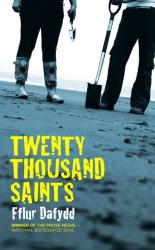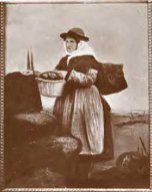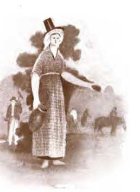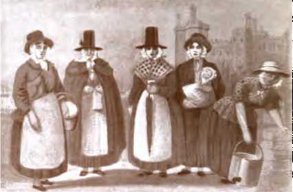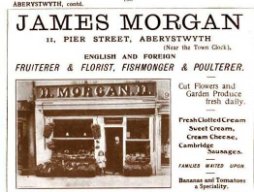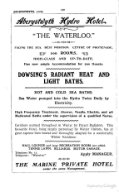Blogs
'Twenty Thousand Saints' by Fflur Dafydd Chosen For People's Book Prize October Showcase!
By Ceri Shaw, 2009-10-01
|
Vote For Fflur Dafydd's 'Twenty Thousand Saints'
Exercise your literary judgement: vote for Fflur Dafydd's Twenty Thousand Saints! Ordinary readers have the chance to be the judges in this new UK-wide competition combining libraries, emerging writers and independent publishers in a monthly showcase of around a dozen titles in the fiction category each calendar month. Nominations for the People's Book Prize are selected competitively every month throughout the year, giving readers a two-month chance to register their vote online. Books with the highest number of votes in the three categories of children's books, fiction and non-fiction go forward to compete for the overall prize, which is awarded at a ceremony in July. Voters are offered prizes and the chance to win free tickets to the gala awards night. Prize patrons are Dame Beryl Bainbridge and broadcaster, author and Reading Champion Paul Blezard, while it is administered by Delancey Press's Tatiana Wilson and championed by TV producer-presenter Julie Hyde Mew. Vote for Twenty Thousand Saints during October and November: voting opens 1 October and closes on 30 November. Vote here: http://www.peoplesbookprize.com/
Buy "Twenty Thousand Saints" HERE .
Read our interview with Fflur Dafydd HERE . |

Americymru: You're a very prolific artist: at 31 you've published four novels, a collection of poems and short stories and non-fiction, written plays, screenplays, you're/you were a columnist for the Western Mail, in addition to a very successful music career which includes four albums, various singles and performances in Wales, Europe and the United States (please let me know what else should be in this list). What do you think of your success, do you feel lucky, tired, excited to go forever or do you ever want to take a break and wait tables or wash dogs?
Fflur: Ive already done my stint as a waitress but Ill pass on washing dogs, thanks! I do feel that Ive been lucky in many respects to have the opportunity to do so many things, and to be honest, when you live in a small country and are part of a minority culture perhaps there is more urgency to do a little bit of everything, to contribute to the culture, to keep it thriving. But I have worked very hard these past years and I dont think success comes without real hard graft, so I do feel a little bit exhausted at times! My new album is coming out next month, and I think once Ive finished promoting that, I will be looking for some downtime eating chocolates and singing Christmas carols. I feel happy with the work Ive produced so far and theres no rush now to publish or to record again for a while.
Americymru: Your first novel in English, 20,000 Saints , was published in 2008 and you've written three novels in Welsh: Lliwiau Liw Nos ("Colours by Night," 2005 Y Lolfa), Atyniad ("Attraction," 2006 Y Lolfa) and Y Llyfrgell ("The Library," 2009 Y Lolfa). Do you have a preference for writing in English or Welsh?
Fflur: Welsh is my first language, so I instinctively want to write in Welsh and find it exciting to do so there is still so much that can be done with the language, and I like to think that Welsh contemporary authors now are helping move the language forward into the 21st century. But writing in English also helps me gain a sense of freedom, the sense of working on a broad canvas where no phrase is impossible, no word unutterable, and where no story would seem implausible there is a great thrill in that.
Americymru: Your latest novel, Y Llyfrgell (The Library), was inspired by your time as a graduate student pursuing your Phd in Aberystwyth, at the National Library of Wales - what can you tell us about this novel?
Fflur: This is a novel about a siege which takes place at the National Library of Wales, when two armed female librarians take the building and its workers hostage one day in 2020. It is a far-fetched, slightly magic realist, black comedy, with lots of action and a fast paced mystery Im very proud of the book and I do think its one of the best things Ive written in Welsh. It says something about Welsh culture and history and is a very political book in many ways. It has also been described as controversial which has certainly helped sales!
Americymru: "20,000 Saints" is also a sort of nickname for Bardsey Island and the second novel you've set there. How did this story develop, what was your process in creating it?
Fflur: I had seen the post of writer in residence on Bardsey advertised by Academi, the Welsh literature promotion agency, as an open call to their members, and it immediately appealed to me. I was writing a PhD thesis on R.S. Thomas, at the time, the Welsh poet-priest who had been instrumental in setting up the Bardsey Island trust, and many of his poems are about the island, as he was a frequent visitor there, and birdwatcher. It felt like I was destined to go there, to follow in his footsteps, to understand him better. I was fortunate enough to get the post, and of course, ultimately, I found the island to be the biggest source of inspiration for my own work. I wrote one book of fiction in Welsh Atyniad based on my own experiences, and then rewrote the book in a completely different way for an English audience, with a different plot, narrative , characters and it also had a different mood and feel.
Americymru: How autobiographical do you think your own work has been? Do you subscribe to the idea that you should write what you know and, if so, what does that mean to you?
Fflur: There is an autobiographical element to most works, I think, and characters always tend to embody parts of yourself. My first novel, Lliwiau Liw Nos, was far removed from my reality, and perhaps because of this, I dont consider it to be a particularly successful novel. Atyniad was heavily influenced by personal experience, and it has an intimacy and honesty that would be impossible without the raw emotion that went into writing that prose; straight out of my own heart, at times. But I have also learnt that ONE autobiographical novel is enough you do need to move away from yourself as a subject ultimately, because readers also want narrative, and they want you to make that necessary leap between your own history and imagination.
Americymru: Any chance your Welsh-language novels will someday get translated into English for those of us not lucky enough to read Welsh yet?
Fflur: One day I hope to be able to let someone else do the translating. It has struck me that Im changing so much when I adapt my own work that the English-language readers are unable to fully access the Welsh language writer in me, that part of me still somehow remains hidden. So Im going to do one more reworking of a novel (Im rewriting The Library now), and then I will let the languages take off in different directions hopefully working with a translator for my Welsh books.
Americymru: You're currently the writer in residence at the University of Iowa and you've previously been a writer in residence in Wales and Finland, what is a "writer in residence" and how did you come to become one?
Fflur: Basically a writer in residence is a when you spend time at a place or an institution, not merely to write about it, but to get time to really work on a project, away from the hassles of your daily life. I think theyre all important things. You usually get thrown in with a group of new people (Bardsey) or a new cultural experience (Helsinki) or you are part of the life of a University (Iowa) and can contribute in all sorts of ways by giving talks and readings and became part of that place for a short space in time. The International Writing Program here at Iowa is an excellent program, stimulating and culturally diverse (as Im here with writers from 32 different countries) and there is time to write during the day, which is a liberating thing. I was offered this post by the British Council the IWP have never had a Welsh language writer and they were interested also in getting a performer here, and so I fit the bill, and I feel extremely proud to have been chosen to represent Wales here.
Americymru: You're traveling to Portland, Oregon with four other writers as part of the International Writer's Program? Who are the other writers and what will you be doing while you're in Portland?
Fflur: I will be joined by Lijia Zhang (China), Soheil Najm (Iraq) Fedosy Santaella (Venezuala) and Osman Pius Conteh (Sierra Leone) and we will engage in a series of literary events, in collaboration with the Pacific Northwest College of Art, Portland State University, and the Oregon Council for the Humanities. This will be the first IWP delegation to take part in such a dynamic slate of activities in the city. There will be visits to classes, group readings on campuses, roundtable discussions and one or two musical performances. Please see http://homeroom.pnca.edu/inline/584932.pdf for further details of events.
|
A Classic of Yesteryear Rummaging in the 'virtual attic' of the Americymru library can occasionally bring to light some long lost treasures.. Who over the age of 100 can fail to remember with fond affection the classic 1907 Great Western Railways vacation guide, 'South Wales: The Country of Castles' . This volume is a treasure trove of useful advice. Witness the following on page 50 :- "......it is impossible to ignore the fact that the use of the motor adds most materially to the possibilities of Aberystwyth as a travel-centre. Too great caution cannot possibly be exercised in the choice both of a chauffeur and a machine. If the former is a novice at local topography, he can only be a source of vexation and perplexity." Certainly one would not wish to engage a perplexing and vexatious chauffer, but the GWR does not content itself with travellers tips , there are also passages of purple prose. On page 160 we find the following description of Tenby at sundown quoted approvingly :- "Towards sundown a miniature fleet of trawlers sweeps gracefully around the Castle Hill, looking for all the world like a flight of brilliant butterflies ; their russet sails glowing in the warm light of the sun's declining rays with every hue from gold to ruddy purple, recalling memories of gorgeous scenes on far-away Venetian lagoons." I was never favored with such a vision on my visits to Tenby. It is at this point that we are perhaps reminded of the fact that laudanum was not made illegal in Britain until the Dangerous Drugs Act of 1920.
Another highlight of the GWR publication is its depiction of Welsh women. The above pin-up parade is included for your delight and delectation.
Bananas & Tomatoes a Speciality Reproduced above is a small selection of charming period advertisements. One is for a Fruiterer & Florist which specialized in bananas and tomatoes and the other is for the Aberystwyth "Waterloo Hydro Hotel" which, somewhat ironically, burned to the ground in 1920. ( click the above thumbnail for a larger image ) |
| A new guide, The Football and Rugby Playing Fields of Wales by Richard E Huws is about to be published. A life-long passion for sport led Huws to undertake a decade of research into the history of around 600 grounds throughout Wales. The result is this informative and comprehensive volume packed with fascinating facts and stats. The entries detail the teams that have played on each pitch and some famous matches that have taken place. The author explains further: I have endeavoured to record the playing fields used by all current senior football and rugby teams in Wales. Fields used by some defunct teams have also been included if they can be clearly identified. I have also attempted to record some special events which have been held on certain fields. These range from agricultural shows to national eisteddfodau, and to other sporting events and unique occasions such as papal visits. The book will appeal to sports fans and those with an interest in local and family history. Huws is surprised at the lack of information about sport in general local history books. He says, I very much hope that this work will inspire local historians to delve deeper into the history of sport in their area and to record in greater detail this somewhat neglected aspect of community activity. I feel that this is especially important as an alarming number of traditional playing fields are falling victim to commercial, housing or transport developments. Born in Carmarthen, the author has spent most of his adult life in Ceredigion. He worked at the National Library of Wales for almost 40 years, and recently retired from the post of Head of Reader Services. He has published widely on the history of printing, local history, family history and sport. He lives in Bont-goch, near Aberystwyth, and is a keen follower of most sports, and especially of his beloved Swansea City. |
| Americymru interview with Amy Wadge here:- "Ten Questions With Amy Wadge" Monday 12th October sees the release of 'Hold Me', the sublimely sweet and simply beautiful single from Welsh songbird Amy Wadge. A love song in the most classic sense, it is an unapologetically direct appeal to a lover, delivered with uncomplicated, but heartfelt lyrics in Amy's trademark vocal. Produced by Stan Kybert (Oasis, Massive Attack, Paul Weller), the track builds from sparse beginnings, through myriad melodies and gorgeous harmonies in the chorus, into a huge, layered sound that makes 'Hold Me' an irresistible teaser of what's to come on her forthcoming album. Amy, who has previously won the much coveted 'Best Female Solo Artist' at the Welsh Music Awards, has taken time off in the last year as she recently became a mum, but is now back with a renewed sense of vigour and a whole new bank of stories to tell and songs to sing. 'Hold Me' is the first single from Amy's new album (due for release in Spring 2010), that is sure to please her ever-growing and dedicated fanbase (especially in her native Wales), as well as win over brand new support from lovers of beautifully crafted songs and a wonderful voice. With years of touring experience under her belt (she has supported Van Morrison, Jeff Beck, Damien Rice and Eric Bibb amongst others), Amy has developed and nurtured an absolutely captivating and quite magical live experience, which she will once more take to the road with over the coming months. Please keep an eye on: www.amywadge.com/ www.myspace.com/amywadge for further announcements. 'Hold Me' will be available digitally from 12th October at: www.amywadgeholdme.com , and will be available to pre-order from 17th August. Upcoming gigs: (see full listings - www.amywadge.com ) October 2009 Thursday 8th Cowbridge Fashion Week - The Hair Business, Cowbridge Saturday 10th House Gig, Private Function Thursday 29th Acapela, Pentyrch (nr. Cardiff) Saturday 31st The Chattery, Swansea |

